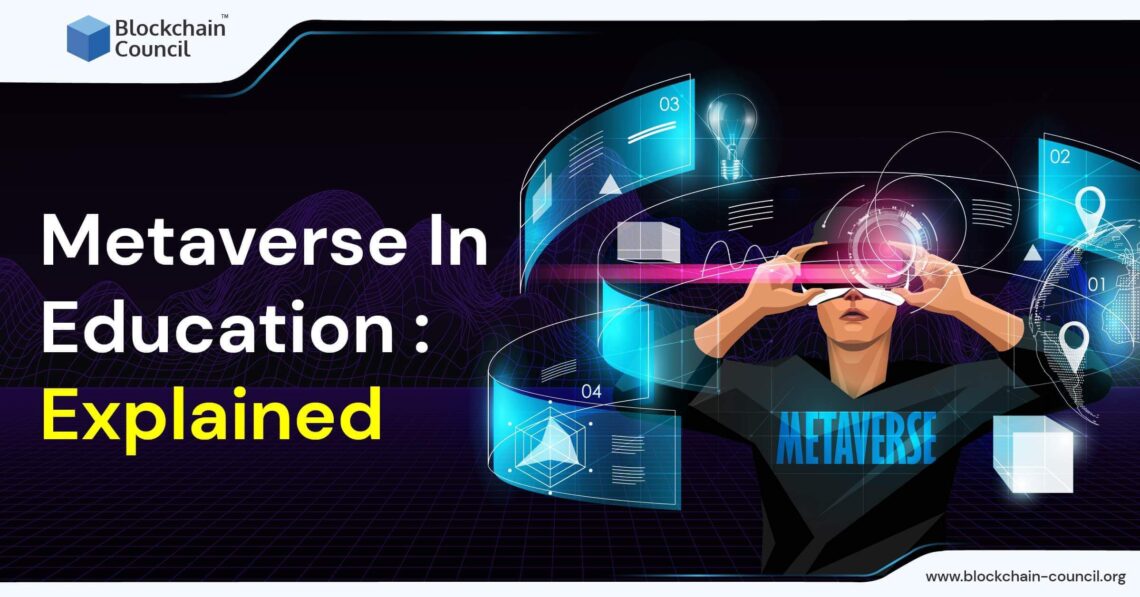
Metaverse In Education: Explained
The covid-19 epidemic’s substantial influence on schooling is hardly a surprise. Disruptions have affected students from practically every country on the globe. Online education has fast developed into a new standard in response to this disruption. Theoretically, this ought to lead to more inclusive and creative educational approaches.
A new era of innovation is beginning to have more chances. Regarding the Metaverse as the future, experiential virtual learning systems are essential. It enables students to participate in intensely dynamic and captivating live classroom sessions. Our strategies for educating children and putting teachers in a position to tackle. These new difficulties must change as metaverse technology advances and creates new realistic and imaginary worlds.
Describe The Metaverse
A system of three-dimensional virtual worlds focused on social engagement is known as a metaverse. It may be viewed as an all-encompassing digital world on a fictitious Internet. The use of virtual and augmented reality equipment helps this virtual reality. It also describes a contemporary industry in which people may produce, buy, and sell goods.
You may move virtual items like clothing or vehicles from one platform to another according to an idealized interpretation of the Metaverse. This may sound like science fiction, but we’re beginning to notice many of these technologies combining, Mark Zuckerberg said during the company’s debut last year. The present version of the metaverse certification school still does not exist.
How Can The Metaverse Modify Online Education?
Although there is still plenty to look forward to from the Metaverse. It has already demonstrated tremendous promise, particularly in the gaming industry. Since a few years ago, players of several video games have been able to engage with one another freely. Moreover, sometimes attend events like parties and concerts using their avatars.
However, the Metaverse certification is not just beneficial for the game business. With the popularity of online learning growing, institutions, educators, and others are exploring methods to make distant learning more dynamic and engaging. Let’s examine a few ways the Metaverse can assist in this.
Making An Interactive And Realistic Online Classroom
The potential of the Metaverse to bring online learning settings to life is the primary advantage that eLearning may get from it. Teachers can design classrooms to meet their specific instructional needs. Their creativity is their only constraint.
Simultaneously, fully editable avatars let students interact with actual items and apply their learning. Additionally, enabling students to utilize avatars that accurately represent themselves rather than hazy cartoons. It provides an added layer of reality to the virtual classroom, increasing student engagement.
Fostering Immersion In Learning
Virtual and augmented reality are the fundamental technologies that underpin the Metaverse. Customers may fully immerse themselves in the virtual environment thanks to the headsets and glasses they are given.
Immersive learning benefits online learners greatly since it allows them to apply theory, improves information retention, and boosts engagement. With the aid of VR and AR, students may participate in games and exercises as if they were actually there. For instance, 3D drawings can assist people in comprehending the operation of a specific piece of equipment. Additionally, the visual representation of a mathematical idea.
Encourage Communication
Understandably, online learning makes it difficult to engage and communicate. Teachers and students who are separated by distance may experience loneliness and isolation. The Metaverse enables teachers to design spaces where they may have internal meetings to combat negative emotions. It also encourages participants to participate.
In parallel, students may create study spaces where they can interact, cooperate, and study in groups. Everybody can connect by viewing one another, quickly sharing data, interacting with identical items, and playing games utilizing unique avatars. These tools encourage interaction between students and teachers, which improves the learning process.
Examples Of The Metaverse Used In Education
It is challenging to arrange private meetings or eat discreetly in a restaurant because of the current COVID-19 outbreak. However, in the Metaverse, tens or even hundreds of thousands can gather to hold a festival or attend a concert by a beloved artist.
Individuals unable to walk outside due to COVID-19 had a new social area to socialize and unwind. Thanks to virtual reality metaverses like Roblox and Zepetto. Learning about using virtual reality in the classroom and comprehending the potential of Blockchain education have various benefits over more conventional methods. Such as enabling students to visit historical locations or carry out risky experiments in a secure environment.
Teachers may provide students with hands-on experience in addition to traditional textbook study. By using Blockchain education and building virtual settings based on their instructional strategies. If you learn Metaverse, it may seem like a far-fetched fantasy, these scenarios happen in our current world.
Education’s Metaverse Advantages
Students can utilize a virtual reality headset to experience environments and actions. They would not be able to do it in the real world, including creating cities or exploring space. Through the use of this virtual setting, individuals from all across the world could be able to participate in classroom discussions. Students will be far more capable of retaining lessons learned from their teachers due to the creative learning environment in the classroom.
The worldwide barrier that separates students and educators from all across the world. It will be diminished because of the widespread use of university virtual campus visits. Thanks to the virtual environment of Metaverse, parents and children won’t have to travel far to attend school. Students are required to reside on campus. Although they will probably be interested in other organizations and want to go wherever they want to class.
Conclusion
The Covid-19 epidemic significantly impacted several industries. Everyone, especially educational institutions, has begun to interact digitally. While online learning lacks teamwork and hands-on experiences. This may substantially influence the student’s performance and motivation to study. The Metaverse certification offers one of their main benefits.
It allows students to immerse themselves in a digital learning environment fully. In an informative manner, the students engage with the teacher and pick up new information. Real-time events occur in all daily activities, including classrooms, workshops, projects, experiments, and seminars.
You May Also Like

NFT Gaming: The Next Big Thing in Metaverse
August 2,
5 Ingenious Soap Box Packaging Ideas to Display in Your Dorm Room or Home Office
February 9,


